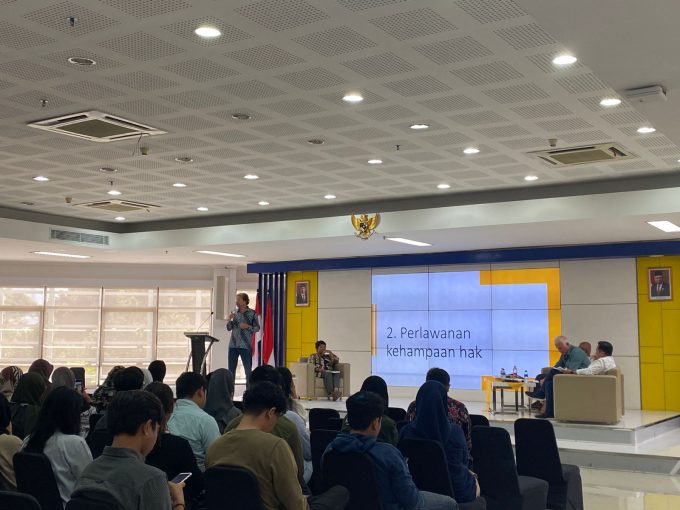
Yogyakarta, August 21st 2023─Resource distribution and allocation has long been a thorny conflict in Indonesia. Feuds between corporations and landowning communities are the most common cases. In fact, communities often find it difficult to obtain their rights due to power differences between the two parties. The issue was raised by three researchers from Indonesia and the Netherlands in the discussion “Seminar on Palm Oil Conflicts and Solutions” on Monday (21/8).
“We found 99 cases of land taking without permission from the community by corporations. The majority of cases are caused by customary land ownership, so they do not have land certificates. This makes many corporations then take over the land, especially for palm oil,” said Prof. Afrizal, a Professor of Sociology at Andalas University. The phenomenon then led to conflicts over land interests, such as demands for compensation, and customary land defense.
This study of palm oil conflicts involved 19 researchers who traced the emergence, chronology, and outcomes of 150 conflicts in West Kalimantan, Central Kalimantan, Riau and West Sumatra. Data was collected by analyzing written sources, government documents, NGOs, and reports from communities. As a result, researchers found various factors in the emergence of conflicts and ineffective resolutions. All the research results and ideas are outlined in a book entitled “The Void of Rights: Communities vs Palm Oil Companies in Indonesia”.
“One of the cases we found in Kalimantan, the people of Olak-Olak Village demanded PT Sintang Raya to return their land. They held a demonstration, then demanded compensation for the land. After being taken to legal channels, the court ruled that PT Sintang Raya must return their land, but it turns out that until now only 5 hectares have been returned. This is not in accordance with the court order,” Afrizal explained. He mentioned that the Olak-Olak Village conflict is a type of conflict that occurs a lot and is not resolved.
Prof. Ward Berenschot, Senior Researcher at KITLV Leiden University also revealed that there are three arguments in this issue. “The land owned by the community is only recognized by custom, there is no certificate. So it can be said that there is a void of rights here. Then secondly, when conflicts occur, people tend to focus on getting financial compensation rather than fighting for their rights legally. Then finally, the conflict resolution mechanism is considered ineffective because people’s rights are ultimately not given,” he said.
The context of the void of rights was explained by Prof. Otto Hospes, Professor at Wageningen University & Research. “Indonesian state regulations strictly regulate licensing procedures. There is compensation, profit sharing in practice, and protection of citizens’ interests. But in practice it is not like that. Many violations occur,” said Otto. Conflict resolution through mediation also does not produce balanced decisions. There were 166 mediation cases, and only 25 reached an agreement. Even after that, there were 43 cases where the company did not want to implement the agreement.
Not only are there conflicts between communities and corporations, various political factors are also very influential. Corporations usually establish internal relationships with local governments to fulfill their interests. This creates a condition where the community is increasingly cornered, because they are pressured by two powers at once. If left unchecked, the community’s economy will be threatened and they will not be able to fulfill their needs.
“We offer a solution to the formation of mediation bodies at the provincial and district levels. The implementation of mediation decisions must also be monitored so that companies really provide community rights according to the agreement. Then we propose that the government conduct regular monitoring and investigations of palm oil companies,” Afrizal said. Through this step, the communities at least have another powerful party that can help them fight for their land rights.
